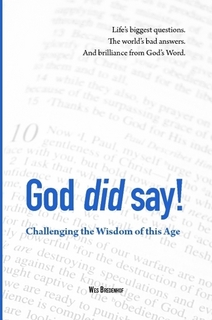Thousands of years ago some of the most fateful words in the history of the universe were spoken. “Did God really say….?” Ever since then, these words have been repeated in conversations, public debates, pulpits, and our own hearts. We need to know when to answer, “No, he did not say that,” and when to proclaim, “God did say!”
In God Did Say! Challenging the Wisdom of this Age, Pastor Wes Bredenhof tackles some of the thorniest issues, giving the world’s modern answer and the Bible’s true one. He discusses
- the reliability of the Bible;
- the existence of objective, public truth;
- the creation of mankind;
- Satan’s subtlety and persistence in spiritual warfare;
- the problems of evil, sin, guilt, and shame;
- the only way to fellowship with God; and
- the basis for our code of ethics.
For example, in the chapter entitled, “Humanity is the Handiwork and Direct Creation of God,” Bredenhof presents incontrovertible evidence from all over the Bible that Adam was specially created and did not develop through evolution. This evidence is not usually presented so clearly in typical debates on origins. (Personal aside: Bredenhof assumes that the vast majority of people believe in evolution, although if that is true I wonder why the Templeton Foundation is investing so much in organizations such as BioLogos, individual scholars, textbook development, and outreach to pastors and churches to ‘engage the community on the topic of evolutionary creation’.)
In “The Nature of Human Sin Revealed,” Bredenhof acknowledges the problem of evil and then goes to the Garden of Eden to explain both its cause and its continuance. Sin always begins with wrong thinking and wrong desires, and both our personal sins and the first sin follow the pattern outlined in James 1:14, 15. Very often, after sinning, we compound the problem by taking a do-it-yourself approach to our guilt rather than turning to Jesus. We are so easily taken in by the world’s idea that the many manifestations of evil are an external problem with internal healing a real possibility, whereas the Bible points out that evil is a spiritual problem with healing possible only through our Saviour.
Obviously there is a very sophisticated campaign going on to confuse Christians on many issues. We should never underestimate the subtlety, patience, and persistence of the father of all lies and half-truths. Most of us, even with careful Bible study, miss the implications of a lot that is being said in our society. That is why a book like this is so valuable and why it was written. Pastor Bredenhof noticed that his congregation was struggling with these issues so he studied them, preached about them, and then adapted his sermons into this book so that Christians would be able to see some of the half-truths and lies that are accepted and actively promoted in our society.
Throughout God did Say! Bredenhof points the reader to the Word of God. He urges us to read it, study it, reflect on it, and really know it. After all, the only way we will be able to counter the insinuations of the age old question, “Did God really say…?” is by knowing what he did say. Only if we know the Bible will we know when to respond, “No, he did not say that, and it is wrong to even suggest it,” and when to affirm, “But this, yes, God really did say this.”
Because this slim volume is quite focused it could be used in high school Bible or apologetics classes as well as in Bible study groups and for personal reflection. It would also help students at universities and colleges. There is no study guide, but each chapter contains a wealth of material for discussion and ends with a brief summarizing contrast of the wisdom of this age and the wisdom of God’s Word that could lead to all sorts of further reflection and study. Those of us who interact extensively with ideas and people opposed to God will find refreshing encouragement and reminders in this book.
This book is not available on Amazon but can be purchased here in both print and ebook versions.
—
Note #1: God Did Say! is aimed specifically at those of the Canadian Reformed tradition and as such there are a few references to Reformed confessions and being Canadian. However, because the book is based solidly on the Bible, it can provide insight to all Christians, no matter where they live or what their theology is.
Note #2: As is often the case with books based on sermons, there are some issues of style and grammar. Fortunately the message is compelling enough that most of these can be ignored.
—
This is yet another book in the in the 2015 52 Books in 52 Weeks Challenge and is also linked to Saturday Reviews, Booknificent Thursdays, Literacy Musings Monday, and The Book Nook as well as Trivium Tuesdays, and Finishing Strong.
Disclosure: I received a review copy of this book from Reformed Perspective Books. My opinions are my own and I am not compensated for sharing them with you.

